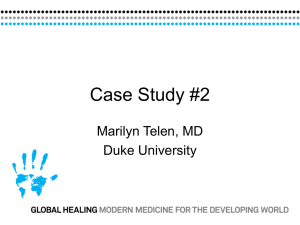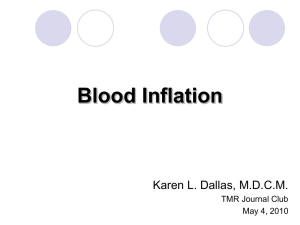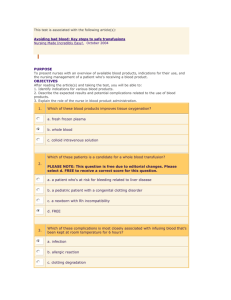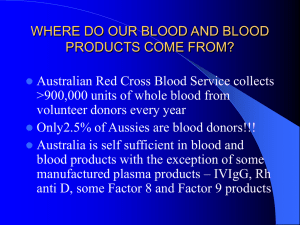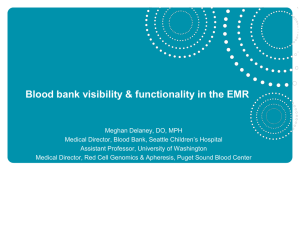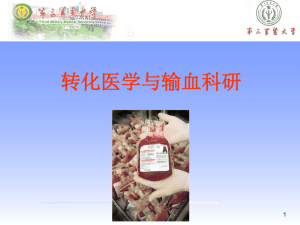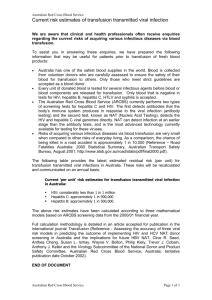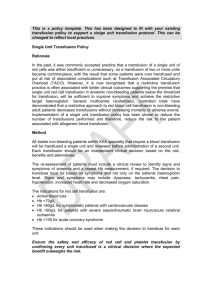National Blood Policy 2000 - Harvard School of Public Health
advertisement
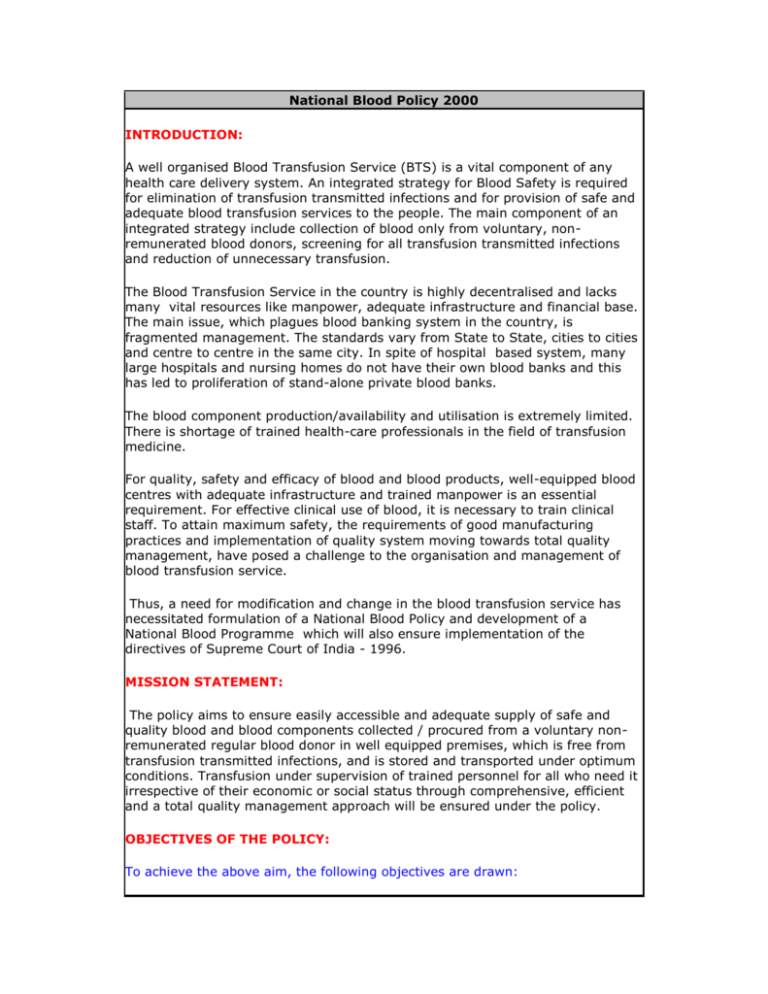
National Blood Policy 2000 INTRODUCTION: A well organised Blood Transfusion Service (BTS) is a vital component of any health care delivery system. An integrated strategy for Blood Safety is required for elimination of transfusion transmitted infections and for provision of safe and adequate blood transfusion services to the people. The main component of an integrated strategy include collection of blood only from voluntary, nonremunerated blood donors, screening for all transfusion transmitted infections and reduction of unnecessary transfusion. The Blood Transfusion Service in the country is highly decentralised and lacks many vital resources like manpower, adequate infrastructure and financial base. The main issue, which plagues blood banking system in the country, is fragmented management. The standards vary from State to State, cities to cities and centre to centre in the same city. In spite of hospital based system, many large hospitals and nursing homes do not have their own blood banks and this has led to proliferation of stand-alone private blood banks. The blood component production/availability and utilisation is extremely limited. There is shortage of trained health-care professionals in the field of transfusion medicine. For quality, safety and efficacy of blood and blood products, well-equipped blood centres with adequate infrastructure and trained manpower is an essential requirement. For effective clinical use of blood, it is necessary to train clinical staff. To attain maximum safety, the requirements of good manufacturing practices and implementation of quality system moving towards total quality management, have posed a challenge to the organisation and management of blood transfusion service. Thus, a need for modification and change in the blood transfusion service has necessitated formulation of a National Blood Policy and development of a National Blood Programme which will also ensure implementation of the directives of Supreme Court of India - 1996. MISSION STATEMENT: The policy aims to ensure easily accessible and adequate supply of safe and quality blood and blood components collected / procured from a voluntary nonremunerated regular blood donor in well equipped premises, which is free from transfusion transmitted infections, and is stored and transported under optimum conditions. Transfusion under supervision of trained personnel for all who need it irrespective of their economic or social status through comprehensive, efficient and a total quality management approach will be ensured under the policy. OBJECTIVES OF THE POLICY: To achieve the above aim, the following objectives are drawn: 1.To reiterate firmly the Govt. commitment to provide safe and adequate quantity of blood, blood components and blood products. 2.To make available adequate resources to develop and re-organise the blood transfusion services in the entire country. 3.To make latest technology available for operating the blood transfusion services and ensure its functioning in an updated manner. 4. To launch extensive awareness programmes for donor information, education, motivation, recruitment and retention in order to ensure adequate availability of safe blood. 5. To encourage appropriate clinical use of blood and blood products. 6. To strengthen the manpower through human resource development. 7. To encourage Research & Development in the field of Transfusion Medicine and related technology. 8. To take adequate regulatory and legislative steps for monitoring and evaluation of blood transfusion services and to take steps to eliminate profiteering in blood banks. OBJECTIVE – 1: To reiterate firmly the Govt. commitment to provide safe and adequate quantity of blood, blood components and blood products. STRATEGY: 1.1. A national blood transfusion Programme shall be developed to ensure establishment of non-profit integrated National and State Blood Transfusion Services in the country. 1.1.1 National Blood Transfusion Council (NBTC) shall be the policy formulating apex body in relation to all matters pertaining to operation of blood centres. National AIDS Control Organisation (NACO) shall allocate a budget to NBTC for strengthening Blood Transfusion Service. 1.1.2 State/UT Blood Transfusion Councils shall be responsible for implementation of the Blood Programme at State/UT level, as per the recommendations of the National Blood Transfusion Council. 1.1.3 Mechanisms for better co-ordination between NBTC and SBTCs shall be developed by the NBTC. 1.1.4 Mechanisms shall be developed to monitor and periodically evaluate the implementation of the National Blood Programme in the country. 1.1.5 The enforcement of the blood and blood products standards shall be the responsibility of Drugs Controller General India ) as per Drugs and Cosmetics Act/Rules, with assistance from identified experts. 1.1.6 NBTC shall ensure involvement of other Ministries and other health programmes for various activities related to Blood transfusion services. 1.2.Trading in blood i.e. Sale & purchase of blood shall be prohibited. 1.2.1 The practice of replacement donors shall be gradually phased out in a time bound programme to achieve 100% voluntary non-remunerated blood donation programme. 1.2.1.1 State/UT Blood Transfusion Councils shall develop an action plan to ensure phasing out of replacement donors. 1.3 The following chain of Transfusion Services shall be promoted for making available of safe blood to the people. 1.3.1 State Blood Transfusion Councils shall organise the blood transfusion service through the network of Regional Blood Centres and Satellite Centres and other Government, Indian Red Cross Society & NGO run blood centres and monitor their functioning. All Regional Centres shall be assigned an area around in which the other blood banks and hospitals which are linked to the regional centre will be assisted for any requirement and shall be audited by the Regional Centre. It will also help the State Blood Transfusion Council in collecting the data from this region. 1.3.2 The Regional Centres shall be autonomous for their day to day functioning and shall be guided by recommendations of the State/UT Blood Transfusion Councils. The Regional Centre shall act as a referral centre for the region assigned to it. 1.3.3 NBTC shall develop the guidelines to define NGO run blood centres so as to avoid profiteering in blood banking. 1.4 Due to the special requirement of Armed Forces in remote border areas, necessary amendments shall be made in the Drugs & Cosmetics Act/Rules to provide special licences to small garrison units. These units shall also be responsible for the civilian blood needs of the region. OBJECTIVE – 2: To make available adequate resources to develop and re-organise the blood transfusion service in the entire country. STRATEGY: 2.1 National & State/UT Blood Transfusion Councils shall be supported/ strengthened financially by pooling resources from various existing programmes and if possible by raising funds from international / bilateral agencies. 2.2 Efforts shall be directed to make the blood transfusion service viable through non-profit recovery system. 2.2.1. National Blood Transfusion Council shall provide guidelines for ensuring non-profit cost recovery as well as subsidised system. 2.2.2. Efforts shall be made to raise funds for the blood transfusion service for making it self-sufficient. 2.2.3. The mechanism shall be introduced in government sector to route the amounts received through cost recovery of blood/blood components to the blood banks for improving their services. OBJECTIVE – 3: To make latest technology available for operating the blood transfusion services and ensure its functioning in an updated manner. STRATEGY: 3.1 Minimum standards for testing, processing and storage shall be set and ensured. 3.1.1. Standards, Drugs & Cosmetics Act/Rules and Indian Pharmacopoeia shall be updated as and when necessary. 3.1.2. All mandatory tests as laid down under provisions of Drugs & Cosmetics Act/Rules shall be enforced. 3.1.3. Inspectorate of Drugs Controller of India and State FDA shall be strengthened to ensure effective monitoring. 3.1.4. A vigilance cell shall be created under Central/State Licensing Authorities. 3.2. A Quality System Scheme shall be introduced in all blood centres. 3.2.1. Quality Assurance Manager shall be designated at each Regional Blood Centre/any blood centre collecting more than 15,000 units per year to ensure quality control of Blood & its components in the region assigned. He shall be exclusively responsible for quality assurance only. 3.2.2 Every blood centre shall introduce an internal audit system to be followed by corrective actions to reduce variations in Standard Operating Procedures(SOPs) as a part of continuous improvement programme. 3.2.3. Regular workshops on the subject of quality assurance shall be conducted to update the personnel working in blood centres. 3.2.4. Regular proficiency testing of personnel shall be introduced in all the blood centres. 3.3. An External Quality Assessment Scheme (EQAS) through the referral laboratories approved by the National Blood Transfusion Council shall be introduced to assist participating centres in achieving higher standards and uniformity. 3.3.1. Reference centres shall be identified in each State/UT for implementation of EQAS. All blood centres shall be linked to these reference centres for EQAS. 3.3.2. NBTC shall identify a centre of national repute for quality control of indigenous as well as imported consumables, reagents and plasma products. 3.4. Efforts shall be made towards indigenisation of kits, equipment and consumables used in blood banks. 3.5. Use of automation shall be encouraged to manage higher workload with increased efficiency. 3.6. A mechanism for transfer of technology shall be developed to ensure the availability of state-of-the-art technology from out side India . 3.7. Each blood centre shall develop its own Standard Operating Procedures on various aspects of Blood Banking. 3.7.1. Generic Standard Operating Procedures shall be developed by the National Blood Transfusion Council as guidelines for the blood centres. 3.8. All blood centres shall adhere to bio-safety guidelines as provided in the Ministry of Health & Family Welfare manual "Hospital-acquired Infections : Guidelines for Control" and disposal of bio-hazardous waste as per the provisions of the existing Biomedical Wastes(Management & Handling) Rules 1996 under the Environmental Protection Act - 1986. OBJECTIVE – 4: To launch extensive awareness programmes for blood banking services including donor motivation, so as to ensure adequate availability of safe blood. STRATEGY: 4.1 Efforts shall be directed towards recruitment and retention of voluntary, nonremunerated blood donors through education and awareness programmes. 4.1.1 There shall not be any coercion in enrolling replacement blood donors. 4.1.2 The replacement donors shall be encouraged to become regular voluntary blood donors. 4.1.3 Activities of NGOs shall be encouraged to increase awareness about blood donation amongst masses. 4.1.4.All blood banks shall have donor recruitment officer/donor organiser. 4.1.5. Each blood centre shall create and update a blood donor’s directory which shall be kept confidential. 4.1.6. In order to increase the donor base specific IEC campaigns shall be launched to involve youth in blood donation activities. 4.2. Enrolment of safe donors shall be ensured. 4.2.1Rigid adherence to donor screening guidelines shall be enforced. 4.2.2 At blood donation camps, appropriate attention shall be paid on donor enrolment and screening in accordance with national standards instead of number of units collected. 4.2.3 A Counselor in each blood centre shall be appointed for pre and post donation counseling. 4.2.4 Result seeking donors shall be referred to a Blood Testing Centre (BTC) for post donation information and counseling. 4.3 State/UT Blood Transfusion Councils shall recognise the services of regular voluntary non-remunerated blood donors and donor organisers appropriately. 4.4 National/State/UT Blood Transfusion Councils shall develop and launch an IEC campaign using all channels of communication including mass-media for promotion of voluntary blood donation and generation of awareness regarding dangers of blood from paid donors and procurement of blood from unauthorised blood banks/laboratories. 4.5 National / State / UT blood transfusion councils shall involve other departments / sectors for promoting voluntary blood donations. OBJECTIVE: 5: To encourage appropriate clinical use of blood and blood products. STRATEGY: 5.1 Blood shall be used only when necessary. Blood and blood products shall be transfused only to treat conditions leading to significant morbidity and mortality that cannot be prevented or treated effectively by other means. 5.2 National Guidelines on "Clinical use of Blood" shall be made available and updated as required from time to time. 5.3 Effective and efficient clinical use of blood shall be promoted in accordance with guidelines. 5.3.1 State/UT Governments shall ensure that the Hospital Transfusion Committees are established in all hospitals to guide, monitor and audit clinical use of blood. 5.3.2 Wherever appropriate, use of plasma expanders shall be promoted to minimise the use of blood. 5.3.3 Alternative strategies to minimise the need for transfusion shall be promoted. 5.4 Education and training in effective clinical use of blood shall be organised. 5.4.1 Medical Council of India shall be requested to take following initiatives: 5.4.1.1 To introduce Transfusion Medicine as a subject at undergraduate and all post graduate medical courses. 5.4.1.2 To introduce posting for at least 15 days in the department of transfusion medicine during internship. 5.4.1.3 To include Transfusion Medicine as one of the subjects in calculating credit hours for the renewal of medical registration by Medical Council of India, if it is introduced. 5.4.2 CME and workshops shall be organised by State Blood Transfusion Councils in collaboration with professional bodies at regular intervals for all clinicians working in private as well public sector in their States. 5.5 Blood and its components shall be prescribed only by a medical practitioner registered as per the provisions of Medical Council Act - 1956. 5.6 Availability of blood components shall be ensured through the network of regional centres, satellite centres and other blood centres by creating adequate number of blood component separation units. 5.7 Appropriate steps shall be taken to increase the availability of plasma fractions as per the need of the country through expanding the capacity of existing centre and establishing new centres in the country. 5.8 Adequate facilities for transporting blood and blood products including proper cold-chain maintenance shall be made available to ensure appropriate management of blood supply. 5.9 Guidelines for management of blood supply during natural and man made disasters shall be made available. OBJECTIVE: 6: To strengthen the manpower through Human Resource Development. STRATEGY: 6.1 Transfusion Medicine shall be treated as a speciality. 6.1.1 A separate Department of Transfusion Medicine shall be established in Medical Colleges. 6.1.2 Medical Colleges/Universities in all States shall be encouraged to start PG degree (MD in transfusion medicine) and diploma courses in Transfusion Medicine. 6.1.3 PG courses for technical training in transfusion medicine (PhD / MSc) shall also be encouraged. 6.2 In all the existing courses for nurses, technicians and pharmacists, Transfusion Medicine shall be incorporated as one of the subjects. 6.3 In-service training programmes shall be organised for all categories of personnel working in blood centres as well as drug inspectors and other officers from regulatory agencies. 6.4 Appropriate modules for training of Donor Organisers/Donor Recruitment Officers shall be developed to facilitate regular and uniform training programmes to be conducted in all States 6.4.1 Persons appointed as Donor Organisers/Donor Recruitment Officers shall undergo training for Donor Motivation and Recruitment organised by State Blood Transfusion Councils. 6.5 Short orientation training cum advocacy programmes on donor motivation and recruitment shall be organised for Community Based Organisations(CBOs)/NGOs who wish to participate in Voluntary Blood Donor Recruitment Programme. 6.6 Inter-country and intra-country exchange for training and experience of personnel associated with blood centres shall be encouraged to improve quality of Blood Transfusion Service. 6.7 States/UTs shall create a separate cadre and opportunities for promotions for suitably trained medical and para medical personnel working in blood transfusion services. OBJECTIVE: 7: To encourage Research & Development in the field of Transfusion Medicine and related technology. STRATEGY: 7.1 A corpus of funds shall be made available to NBTC/SBTCs to facilitate research in transfusion medicine and technology related to blood banking. 7.2 A technical resource core group at national level shall be created to coordinate research and development in the country. This group shall be responsible for recommending implementation of new technologies and procedures in coordination with DC(I). 7.3 Multi-centric research initiatives on issues related to Blood Transfusion shall be encouraged. 7.4 To take appropriate decisions and/or introduction of policy initiatives on the basis of factual information, operational research on various aspects such as various aspects of Transfusion Transmissible Diseases, Knowledge, Attitude and Practices (KAP) among donors, clinical use of blood, need assessment etc shall be promoted. 7.5 Computer based information and management systems shall be developed which can be used by all the centres regularly to facilitate networking. OBJECTIVE: 8: To take adequate legislative and educational steps to eliminate profiteering in blood banks. STRATEGY: 8.1 For grant/renewal of blood bank licenses including plan of a blood bank, a committee, comprising of members from State/UT Blood Transfusion Councils including Transfusion Medicine expert, Central & State/UT FDAs shall be constituted which will scrutinise all applications as per the guidelines provided by Drugs Controller General India ). 8.2 Fresh licenses to stand-alone blood banks in private sector shall not be granted. Renewal of such blood banks shall be subjected to thorough scrutiny and shall not be renewed in case of non-compliance of any condition of licence. 8.3 All State/UT Blood Transfusion Councils shall develop a State Action Plan for the State/UT Blood Transfusion Service where in Regional Blood Transfusion Centres shall be identified. These centres shall be from Government, Indian Red Cross Society or other NGO run blood banks of repute. Approved regional blood centres/government blood centres/Indian red cross blood centres shall be permitted to supply blood and blood products to satellite centres which are approved by the committee as described in para 8.1. The Regional Centre shall be responsible for transportation, storage, cross-matching and distribution of blood and blood products through satellite centres. 8.4 A separate blood bank cell shall be created under a senior officer not below the rank of DDC(I) in the office of the DC(I) at the headquarter. State/UT Drugs Control Department shall create such similar cells with the trained officers including inspectors for proper inspection and enforcement. 8.5 As a deterrent to paid blood donors who operate in the disguise of replacement donors, institutions who prescribe blood for transfusion shall be made responsible for procurement of blood for their patients through their affiliation with licensed blood centres. 8.6 States/UTs shall enact rules for registration of nursing homes wherein provisions for affiliation with a licensed blood bank for procurement of blood for their patients shall be incorporated. 8.7 The existing provisions of drugs & Cosmetics Rules will be periodically reviewed to introduce stringent penalties for unauthorised/irregular practices in blood banking system.
